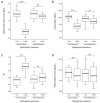Adrenalectomy abolishes hypergravity-induced gastric acid hyposecretion
- PMID: 28430608
- PMCID: PMC5458160
- DOI: 10.18632/oncotarget.15408
Adrenalectomy abolishes hypergravity-induced gastric acid hyposecretion
Abstract
Jet fighter pilots experience high gravitational acceleration forces in the cephalocaudal direction (+Gz), causing severe stress. Stress affects different physiological functions of the gastrointestinal tract. Although the effects of exposure to hypergravity on cardiovascular and cerebral functions have been the subject of numerous studies, crucial information regarding potential pathophysiological alterations following hypergravity exposure in the gastrointestinal tract is lacking. We recently documented a significant decrease in gastric secretory activity in rats after acute exposure to hypergravity. In the present study, we investigated the effects of adrenalectomy on gastric acid secretion and plasma gastrin level in hypergravity-exposed rats. Male Sprague-Dawley rats were adrenalectomized and exposed to +10Gz three times for 3 min. Gastric juice and blood samples were collected, and the volume and total acidity of gastric juice and plasma level of gastrin were measured. Consistent with our previous data, acute exposure to +10Gz significantly altered the gastric juice parameters in the sham-operated rats. The volume (P < 0.001) and acidity (P < 0.001) of gastric juice in the hypergravity-exposed rats were significantly lower than those in the nonexposed rats. In contrast, in adrenalectomized rats, the differences in the gastric juice volume (P = 0.712) and acidity (P = 0.279) were not statistically significant between the hypergravity-exposed and nonexposed rats. We demonstrated that adrenalectomy abolished hypergravity-induced gastric acid hyposecretion, but did not influence gastrin release. These findings suggest that the adrenal glands are required for hypergravity-induced gastric acid hyposecretion.
Keywords: Pathology Section; adrenalectomy; gastric acid; gastrin; hypergravity; rat.
Conflict of interest statement
The authors declare that they have no conflicts of interest.
Figures

Similar articles
-
Gastric acid response to acute exposure to hypergravity.Oncotarget. 2017 Jan 3;8(1):64-69. doi: 10.18632/oncotarget.13969. Oncotarget. 2017. PMID: 27992379 Free PMC article.
-
Gastric acid secretion in experimental acute uremia.Can J Physiol Pharmacol. 2013 Sep;91(9):693-9. doi: 10.1139/cjpp-2013-0052. Epub 2013 Apr 3. Can J Physiol Pharmacol. 2013. PMID: 23984953
-
A comparison between tocopherol and tocotrienol effects on gastric parameters in rats exposed to stress.Asia Pac J Clin Nutr. 2005;14(4):358-65. Asia Pac J Clin Nutr. 2005. PMID: 16326642
-
Low gastric acid and high plasma gastrin in high-anxiety Wistar Kyoto rats.Scand J Gastroenterol. 2009;44(4):401-7. doi: 10.1080/00365520802624185. Scand J Gastroenterol. 2009. PMID: 19089754
-
Cholecystokinin in the control of gastric acid and plasma gastrin and somatostatin secretion in healthy subjects and duodenal ulcer patients before and after eradication of Helicobacter pylori.J Physiol Pharmacol. 1994 Dec;45(4 Suppl 1):3-66. J Physiol Pharmacol. 1994. PMID: 7787215 Review.
References
-
- Marieb EN, Hoehn K. San Francisco, USA: Benjamin Commings; 2010. Human Anatomy & Physiology.
-
- Guyton AC, Hall JE. Textbook of Medical Physiology. Philadelphia, USA: Saunders Elsevier; 2011.
-
- Lonnerholm G, Knutson L, Wistrand PJ, Flemstrom G. Carbonic anhydrase in the normal rat stomach and duodenum and after treatment with omeprazole and ranitidine. Acta Physiol Scand. 1989;136:253–262. - PubMed
-
- Caldwell JA., Jr Fatigue in the aviation environment: an overview of the causes and effects as well as recommended countermeasures. Aviat Space Environ Med. 1997;68:932–938. - PubMed
MeSH terms
Substances
LinkOut - more resources
Full Text Sources
Other Literature Sources
Medical

